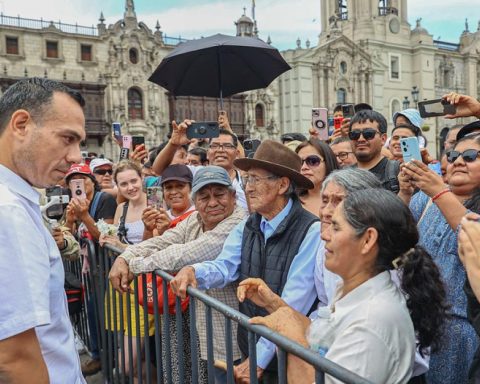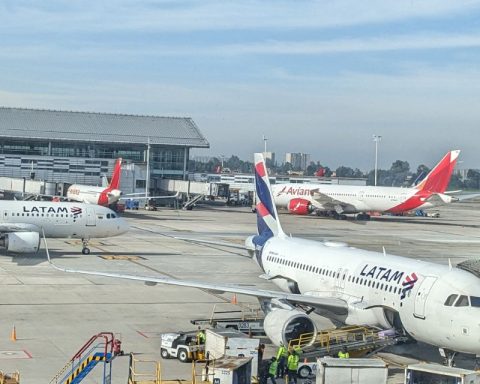
The common slogan was “more autonomy for the regions” and “end excessive centralization”, however, there were few who did not express resentment with one or some of the articles of the report of the State Form commission that the plenary session of the Convention voted in general yesterday, even when they announced that they would overwhelmingly support the proposals. While some conventionalists wore signs at their posts with “more power for the regions” and “Regional State”, others used their 3 minutes to make a harsh criticism, accusing a covert federalism and affirming that “not even the US dared to do so much ”.
The debate was intense, and starting the plenary, the secretary of the Convention, John Smok, gave an account of trades and communications, including a trade from the Political System Commission, agreed “not to raise a conflict of jurisdiction between that commission and the State Form Commission”, given the claims of the constituent Renato Garín, who accused the report voted last night of interfering in issues that went beyond his powers, and which was again put in plenary session by other constituents and Garín himself.
From early on, a long session of the plenary session was noticed, which yesterday debated and voted in general on the second report, this time from the commission on the Form of State. The document contains 36 articles and a separate vote was requested. The presentations of the constituents lasted until around 11:30 p.m., when the vote on each of the points began, ending shortly before 2 a.m.
The results and the PC-FA round
In total, the plenary session managed to approve most of the articles by a quorum of two-thirds: 28 of the 36 articles advanced favorably, while 8 were rejected. Among those approved is Article 1, which establishes that Chile is a Regional State, a formula that in Vamos por Chile they accused of “disguised federalism”, while from the commission they clarified that it is an intermediate system between a unitary State and a which aims to recognize and empower regions in their diversity.
Those approved will go back to the plenary session for discussion in particular tomorrow, where several have already warned that they will make their points regarding some details, in form and substance. Meanwhile, the rejected ones will return to the State Form commission to be debated again, among them the point that was warned as the most controversial, referring to the Regional Legislative Assemblies.
The issue was present in most of the presentations of the constituents of Vamos por Chile, and was looked at carefully by sectors such as the FA and MSC, given that part of these sectors were willing to yield from the unicamerality to the bicamerality in exchange to promote these assemblies, pushed by Amaya Álvez (FA) and Tammy Pustilnick (INN), given the minimal difference that occurred in the Political System commission, because if these accounts reached the plenary session, the idea of a single Chamber would fall in Congress.
Finally the article 25 was rejected by 100 votes in favor, 51 against and 2 abstentions, and in detail it established that “the Regional Legislative Assembly is the body of popular, collegiate, autonomous, plurinational and joint representation, endowed with legislative, decision-making and supervisory powers within the scope of its powers, in accordance with the Constitution and the laws (…) It will correspond to the Regional Assemblies to elaborate and approve their own regulations, in the terms of the Constitution and the respective Regional Statute”. In the rejection votes were those of Vamos por Chile, the Collective of Approval and those of the Communist Party.
Already in its 3 minutes the constituent Mark Barraza (PC) gave an account of the distance with which they looked at aspects of the report, speaking directly of “excesses”, referring to “legislative attributions can be counterproductive in the perspective of the transformations that this Constituent Convention pursues, because they can fragment the State already As a consequence, exacerbate inequalities. Barraza, one of those who has led the talks with the other blocs from the PC, added that the regional riches should give well-being to those who live there but also to the rest of the Chilean men and women. He spoke of inconvenient decisions, also citing collective bargaining or strikes differentiated by region. After the vote, Barraza emphasized that “we don’t vote the same way as the right,” but they approved most of the regulations and rejected those that should be improved. “We do not share the thesis that there are 16 different congresses in Chile and that this gives way to legislation differentiated by region.”
the constituent Jeniffer Mella (FA), one of the coordinators of the State Form commission, lambasted the PC and stated that it seemed strange to her that the Communist Party proposed only a weakened presidential system and a decentralized unitary State. “It is to replicate the 1980 Constitution, and I thought that they were part of the transforming and progressive forces that came here to effectively propose a 21st century Constitution for all the peoples of Chile,” she emphasized.
Thus, and returning to the point of unicamerality – bicamerality, the issue of the Legislative Assemblies generated internal tension, since several in private saw it as contradictory to bet on reducing chambers, but at the same time expanding legislative deliberation to local spaces. Resolved the Assemblies, the definition on the formula of Congress, until dawn, continued without white smoke. The talks continued and the next few hours will be key for that negotiation. In any case, the conviction has already been installed – constituents admit – that there are not 2/3 of the votes to advance in unicamerality, so the bicameral formulas are on the table to explore them.
On the side of Vamos por Chile, practically all the interventions mentioned the point. One of them was the conventional Alvaro Jofre (RN), who classified as “problematic” the powers of the Regional Legislative Assemblies, “such as the approval of the creation of public companies, exclusivity in the creation, modification or suppression of contributions and rates and establishment of regional tax benefits”, also adding the article on recurring legislative powers, which is where the issue of strikes and collective bargaining is addressed.
Meanwhile, from the Collective of Approval they also highlighted resentments, as did Fuad Chahin (DC), who emphasized that “I am concerned that this legislative assembly defines its own perimeters of competence.” In that sector they say that there is a willingness to review these articles to advance in their approval, but reviewing in detail the competencies and being able to move forward in clearing up the points that generate doubts and that could mean damage.
the final vote
- Article 1. Regional State. Approved, with 112 votes in favor, 32 against and 8 abstentions
- Article 2. Territorial entities. Approved, with 103 votes in favor, 46 against and 3 abstentions
- Article 3. Territory. Approved with 128 votes in favor and 25 against
- Article 4. Maritorio. Approved with 111 votes in favor, 36 against and 6 abstentions
- Article 5. Autonomy of territorial entities. Approved with 111 votes in favor, 37 against and 2 abstentions
- Article 6. Solidarity, cooperation and territorial association in the Regional State. Approved with 141 votes in favor, 2 against and 11 abstentions
- Article 7. Participation in the territorial entities of the Regional State. Approved with 116 votes in favor, 34 against and 4 abstentions
- Article 8. Territorial development. Approved with 120 votes in favor, 11 against and 23 abstentions
- Article 9. Equity, solidarity and territorial justice. Approved by 146 votes in favor, 1 against and 6 abstentions
- Article 10. Plurinationality and interculturality in the Regional State. Approved with 115 votes in favor, 37 against and 2 abstentions
- Article 11. Application and cessation to the positions of the territorial entities. Approved by 117 votes in favor, 28 against and 8 abstentions
- Article 12. Principle of non-tutelage between territorial entities. Approved with 146 votes in favor, 2 against and 5 abstentions
- Article 13. Correspondence between powers and resources. Approved with 149 votes in favor, 2 against and 2 abstentions
- Article 14. Competition issues. Approved with 139 votes in favor, 2 against and 3 abstentions
- Article 15. Freedom of movement between territorial entities. Approved with 125 votes in favor, 15 against and 14 abstentions
- Article 16. Preferential filing of powers. Approved with 129 votes in favor, 11 against and 3 abstentions
- Article 17. Territorial differentiation. Approved with 151 votes in favor, 1 against and 1 abstention
- Article 18. Autonomous regions. Approved with 109 votes in favor, 39 against and 1 abstention
- Article 19. Residual clause. Rejected with 87 votes in favor, 65 against and 1 abstention
- Article 20. Regional statute. Approved with 105 votes in favor, 47 against and 1 abstention
- Article 21. Preparation, approval and reform of the regional statute. Approved with 107 votes in favor, 44 against and 2 abstentions
- Article 22. Regional authorities. Approved with 111 votes in favor, 40 against and 1 abstention
- Article 23. Regional government. Approved with 116 votes in favor, 13 against and 23 abstentions
- Article 24. Council of mayors and mayors. Approved with 142 votes in favor, 5 against and 2 abstentions
- Article 25. Regional Legislative Assembly. Rejected with 100 votes in favor, 51 against and 2 abstentions
- Article 26. Regional Social Council. Approved with 110 votes in favor, 19 against and 23 abstentions
- Article 27. Powers of the autonomous region. Approved with 109 votes in favor, 31 against and 1 abstention
- Article 28. Entities with powers over all territory. Approved with 113 votes in favor, 38 against and 2 abstentions
- Article 29. Council of Governors. Approved with 109 votes in favor, 43 against and 1 abstention
- Article 30. Ministries and public services. Rejected with 82 votes in favor, 70 against and 1 abstention
- Article 31. Exclusive powers of the Regional Legislative Assembly. Rejected with 100 votes in favor and 54 against
- Article 32. Exclusive jurisdiction of regional legislation. Rejected with 102 votes in favor and 52 against
- Article 33. Concurrent legislative powers. Rejected with 82 votes in favor and 72 against
- Article 34. Regional legislation. Rejected with 102 votes in favor, 51 against and 1 abstention
- Article 35: Exclusive powers of the regional government. Approved with 104 votes in favor, 47 against and 1 abstention
- Article 36. Control and supervision. Rejected with 88 votes in favor and 63 against
Check here the full report of the commission on the Form of State that the plenary voted on yesterday.

















